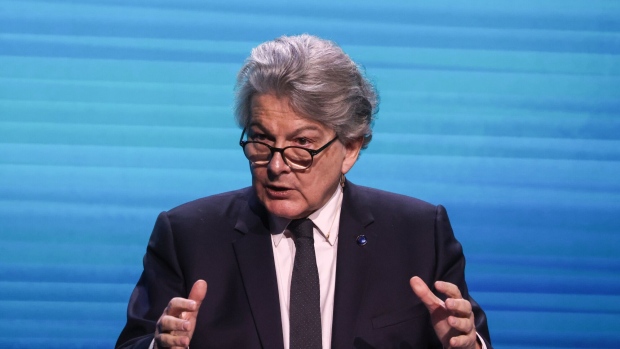Mar 23, 2023
EU Eyes New Funds of Up to €500 Million to Help Ammunition Firms
, Bloomberg News

(Bloomberg) -- The European Union plans to spend as much as €500 million ($544 million) to support ammunition producers through the bloc’s budget, European Commissioner Thierry Breton said in an interview.
The funds would come on top of the €2 billion agreed by foreign and defense ministers earlier this week as the EU aims to provide Ukraine with 1 million rounds of artillery ammunition over the next year, a goal that leaders are expected to sign off on at a two-day summit in Brussels which started Thursday.
The funds outlined by Breton, between €300 million and €500 million, would be part of the third track of a broader strategy to boost production capacity in the EU, including by clearing bottlenecks. The program also involves joint purchases of ammunition and reimbursing, through the European Peace Facility, what member states send from their stockpiles of both modern and Soviet-era ammunition to Ukraine.
Breton, the internal market commissioner, acknowledged a possible bottleneck in gunpowder production. “We have that on our radar, we’ve already started to work on this,” Breton said, adding that some countries are already candidates to build new capacities.
Member states have been informed that one key challenge to manufacturing ammunition is the supply of gunpowder as it is currently supplied by a handful of countries. The EU is looking to boost production at both existing locations and new ones.
There are other more political hurdles, too. Bulgaria, a big producer of Soviet-style ammunition like the one used by Ukraine, will work with the EU to boost its arms industry but won’t take part in joint ammunition purchases for Ukraine, President Rumen Radev told reporters ahead of the summit in Brussels.
Bulgarian Shells
“We will engage only with ammunition that can go to our partners and allies if they want it from us, but not with Ukraine,” Radev said. Bulgaria, along with Hungary, has repeatedly refused to provide military aid to Ukraine, though Bulgarian shells have found their way to Ukraine through third countries.
Breton said in the interview, which followed a visit to defense production facilities including in Slovakia and Bulgaria, that he believes the EU can deliver the 1 million shells to Ukraine in the next 12 months.
“It is a challenge, but using the existing stocks that member states have, which could be freed immediately, and with an increase in production capacity, yes, I’m confident we should be able to achieve this ambitious target for Ukraine,” Breton said.
EU leaders are also set to discuss options to unlock another €3.5 billion for the EPF, but many countries have questions about how it would be used. The EPF, which reimburses member states for their weapons deliveries to Ukraine and funds other projects, currently has a budget of around €7.7 billion, with much of it already pledged to support Kyiv.
More Cash Needed
But the ammunition commitments will exhaust the fund and more cash is needed to reimburse for other types of weapons countries may send in the future.
Defense companies in Europe in particular are struggling to expand production to the scale necessary, with many saying they lack the contracts needed to make large investments and open new facilities or produce to capacity.
Sebastian Chwalek, the head of Polish Armaments Group, a holding company that pools Polish state-owned defense industry firms, described the EU’s goal to provide Ukraine with a million shells within a year as currently “beyond reach.”
Accelerating production could take months if not years as it has to be implemented at all levels of the supply chain and firms are prohibited under international law from producing items without a specific contract, he told Bloomberg.
While European governments have pledged to increase defense spending following Russia’s invasion of Ukraine, it takes time to inject cash into the industry after two decades of declining spending. Only after 2014, when Russia annexed Crimea, did spending in Europe start to pick up again.
The “key is to establish evenly-distributed production in the EU,” Slovenian Prime Minister Robert Golob said in Brussels, adding Slovenia should also take part in production of ammunition.
--With assistance from Alberto Nardelli, Natalia Ojewska, Jan Bratanic and Slav Okov.
(Updates with quotes from industry, EU leaders)
©2023 Bloomberg L.P.






